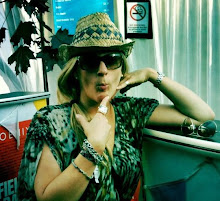When I think back to when I was a young teenager, all I remember reading was every Judy Blume novel (the favourite of which was "Are You There God Its Me Margaret") and all the Point Horror books. I'm not really a fan of horror in general, so I'm not sure why I liked these books so much. I guess they were incredibly tame on the scary scale, so much so that I think I thought I could do better and write one myself. I got as far as the name of the book (not a clue now) and a list of all the characters. But my mediocre, tame, horror-novel plight ended there and was never returned to, even though somewhere in the depths of my sub-conscious, I have always loved the idea of writing a proper novel.
Based in London, one of the great publishing houses,
Faber and Faber have an academy that runs various short and long courses dedicated to creative writing. There is, luckily for me a one-day workshop focusing on how to get going on starting a novel. The course is led by the academy's director of fiction, Richard Skinner, himself a novelist and poet.
All we were asked in preparation for the workshop was to bring our favourite novel with us and begin the day by showing the group. An easy task for me. For a very long time my favourite book has been The Confederacy of Dunces by John Kennedy Toole. The main character Ignatius J. Reilly is a grotesque, belching, farting slob, yet an educated one on a crusade to rid the world of dunces and sit around his Mother's house idealising about his life and stuffing his fat face. It was a book that made me laugh out loud and ever since I've been searching for books that are just as hilarious.
Out of the other fifteen favourites brought, I had only read one and heard of a few. It just shows you the abundance of stories that there are out there and that any single one could be a person's favourite: its not just about the well-known crowd pleasers.
But what is it that makes a good novel? Its not the ones that are written from the head or the heart, Richard told us, it the ones written from your stomach. Its the idea that sits with you in the pit for months and months, brewing and stewing. If its still good after that, then start writing. Quite a simple way to think about what you're going to write is to think about what you read. There has to be a pattern there and themes that we are all drawn to. After writing a list of ten or so novels that have touched us in some way, we were quite surprised to all have common themes. But, ultimately, it is inevitable and that is what we should be writing about.
We did an exercise where we had to pick a page at random from our favourite book and then copy and write out that page. We then had to discuss in groups what struck us while copying out the words. The point is to look at how others write, the authors that you like and are moved by, because fundamentally we are all going to, in some way imitate what we know and love. Imitation is close to invention.
We then moved onto some improvisation exercises, writing about some totally random things; an old friend, what we did yesterday and then connecting the two seemingly, unrelated ideas and creating a story, a connection. Good writing isn't abut copying the world around you, its about creating something out of nothing and this was a very simple exercise to show us that everything is there and available for you, you just have to get on and write.
The second half of the day was much more about the ideas and how to go about telling the great story. We worked on some simple writing exercises that showed the importance of cause and effect in storytelling. The idea is that stories are made up of events that are all linked. Things happen because of other things, not in spite of them.
We were given some simple sentences and asked to put them and some we were to make up, with in a particular order that tells a great story. This was actually where I struggled a bit. I don't know if I'm giving myself a hard time or perhaps creative writing just isn't for me, but I found it hard to think laterally and be imaginative with the story potential. Another exercise confirmed that for me. We were given the beginning and ending of a plot and had to link the two with the middle and my imagination just didn't run wild. Perhaps its because I'm such a visual person and need to know whats in front of me, i.e. have the facts. Maybe I am much better at writing about what I know. Perhaps I've always been better at factual writing as supposed to creative writing.
So, I'm not so sure that I got out of this course what I was supposed to, but it did help me to realise that maybe creative writing isn't for me, at least not quite yet! Plus I can't see a book written about what I know i.e. me would be a mega page-turner. One day maybe!




0 Comments:
Post a Comment